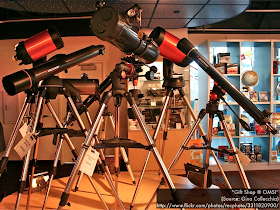Cuesta College, San Luis Obispo, CA
Students have a weekly online reading assignment (hosted by SurveyMonkey.com), where they answer questions based on reading their textbook, material covered in previous lectures, opinion questions, and/or asking (anonymous) questions or making (anonymous) comments. Full credit is given for completing the online reading assignment before next week's lecture, regardless if whether their answers are correct/incorrect. Selected results/questions/comments are addressed by the instructor at the start of the following lecture.
The following questions were asked on reading textbook chapters and previewing presentations on reviewing the history of astronomy, Kepler's and Newton's laws, and telescope powers.

Selected/edited responses are given below.
Describe something you found interesting from the assigned textbook reading or presentation preview, and explain why this was personally interesting for you.
"Retrograde and prograde motion--it is crazy to think that planets change their motion from east to west while going on constant movement."
"I always thought magnification was the most important aspect of a telescope, but we find that's not true."
"Each astronomer has their own unique discovery that is very different from the others. It is interesting because each astronomer contributes to the field from different directions."
"Different kinds of telescopes. I've never heard of a telescope that uses mirrors."
"Orbital motion--it was interesting to discover that objects in orbit are actually falling toward Earth's center, but continuously missing Earth because of the object's horizontal velocity."
Describe something you found confusing from the assigned textbook reading or presentation preview, and explain why this was personally confusing for you.
"I was getting a bit mixed-up with which astronomer did what. They all tend to mush together in my head. I enjoy reading about them but I have a hard time remembering the details about each."
"Having a hard time learning all these laws!"
When a planet is undergoing retrograde motion, over several nights it moves __________ with respect to the background stars.
east to west. ************ [12] west to east. **** [4] (Either of the above choices is possible.) ***** [5] (Unsure/lost/guessing/help!) ****** [6]
When a planet is undergoing prograde motion, over several nights it moves __________ with respect to the background stars.
east to west. ****** [6] west to east. ************ [12] (Either of the above choices is possible.) ** [2] (Unsure/lost/guessing/help!) ******* [7]
The __________ powers of a telescope depends on the: (Only correct responses shown.)
light-gathering power: diameter of the primary lens/mirror [63%]
resolving power: diameter of the primary lens/mirror [44%]
magnifying power: both the focal lengths of the primary lens/mirror and eyepiece: [44%]
The least important feature to consider when purchasing an optical telescope is the __________ of its images.
brightness. *** [3] resolution. ** [2] magnification. ****************** [18] (Two of the above choices.) [0] (Unsure/lost/guessing/help!) **** [4]
Briefly explain your answer for the least important feature to consider when purchasing an optical telescope.
"Light-gathering power and resolving power are fundamental to achieving a bright, detailed image. Along with that, they also cannot be altered, while the magnification can be improved by simply changing the eyepiece."
"Because improving magnification enlarges any distortions, but does not make them clearer."
"Higher magnifying power does not necessarily show you more detail, because the amount of detail you can see in practice is limited by a combination of the atmosphere's seeing conditions and the telescope's resolving power. A telescope's primary function is to gather light and thus make things that are fainter seem brighter, therefore the light-gathering power and resolving power (ability to see fine details) are the most important. On the other end, magnifying power can be changed by changing the eyepiece."
Ask the instructor an anonymous question, or make a comment. Selected questions/comments may be discussed in class.
"Why are some light waves more dangerous than others, is it because one is longer and one is shorter or what? What is it that makes these waves more dangerous?" (The energy of a photon is inversely dependent on wavelength; gamma rays have short wavelengths and thus a single gamma ray photon has a lot of energy (and is dangerous); while microwaves have long wavelengths and thus a single microwave photon contains very little energy (and is relatively safer). However, that is not an excuse to go out and absorb lots of microwave photons.)
"Do you own a telescope?" (No, because I use Cuesta College telescopes whenever I feel like it.)
"Which telescope brand(s) would you recommend most?" (You'll see some reputable telescope brands for yourself when we take a field trip out to the North County Campus telescope shelter. Later this week you'll investigate what specifications (regardless of brand) makes a good telescope.)
"Well, I am almost certain that you won't read this considering I am turning in this assignment pretty last minute. But anyways, who is your favorite astronomer?" (Personally, Will Kyselka, who worked at the Bishop Museum Planetarium in Honolulu, HI. He was willing to answer every question about black holes and worm holes from an obnoxious second grade student on a science camp field trip. (He helped rediscover ancient Hawaiian seafaring navigation skills using the night sky--if you know what "Eddie Would Go" means--that also happened on one of those historical voyages.))
"Telescopes are cool but reading about them is boring." (Cool story, bro.)
"Can you choose my question for class?" (I just did. So, there.)
No comments:
Post a Comment